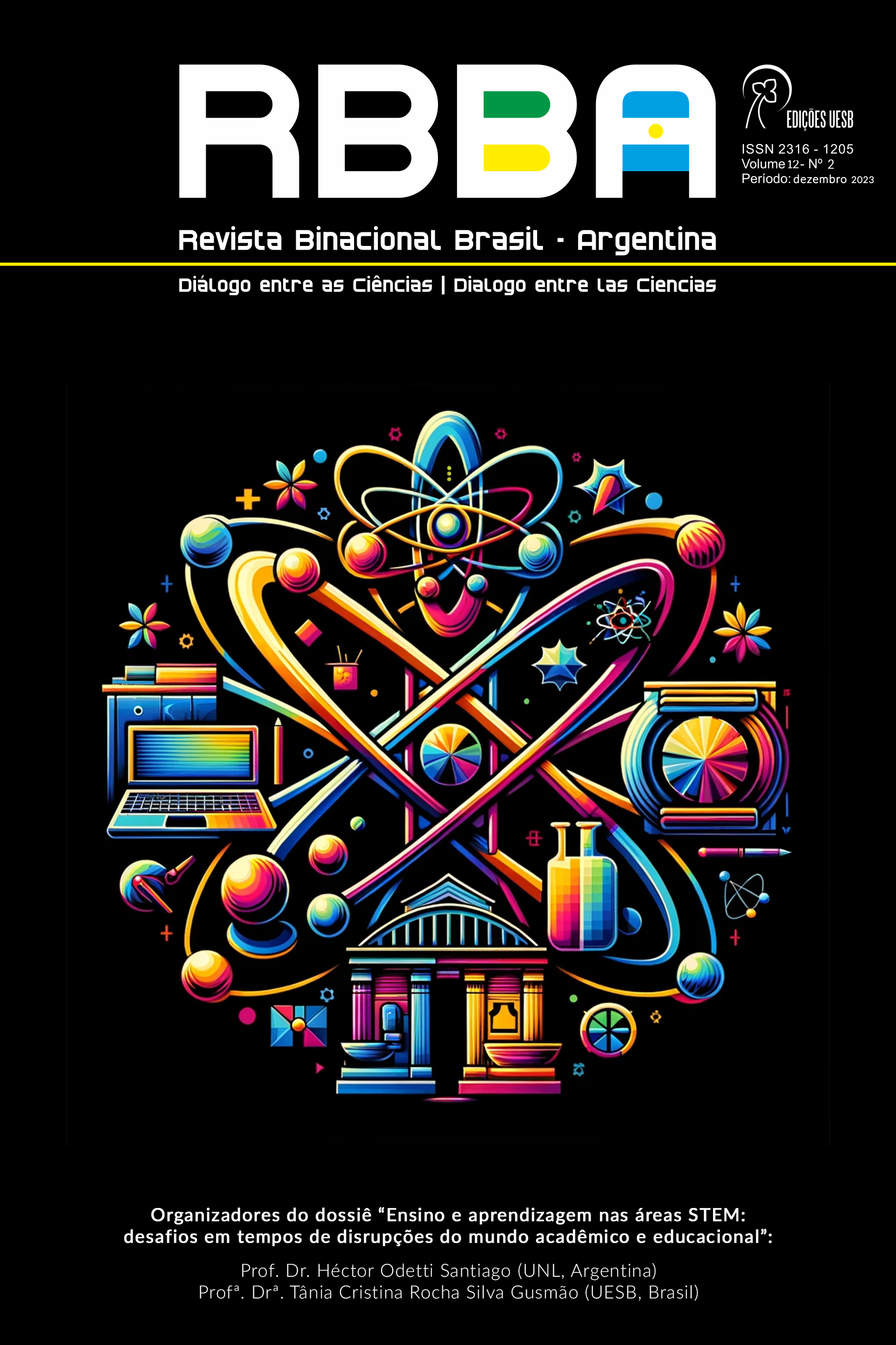ACTIVE METHODOLOGIES: A SURVEY ON THEIR USE IN BRAZIL
DOI:
https://doi.org/10.22481/rbba.v12i02.12685Keywords:
Active methodologies, Brazilian education, Collaborative learningAbstract
This article aims to analyze the progress of the use of active methodologies in Brazilian education, and its most used methods. Based on the fact that Brazilian educators are familiar with Paulo Freire's pedagogical thinking, with a focus on combining students' knowledge and coexistence with the basis for teaching, a method that converges with the active teaching methodology, where the incentive to sharing between teacher/student in the protagonism in the teaching process. A brief description of the methods described in the research was elaborated as a way to improve the understanding of their use. The applied methodology was a bibliographical review, in the Scopus database related to the period from 2017 to 2021, based on the delimitation of the period encompassing before the isolation until the full return of school activities; only articles with the description of the method and the result of its application and the identification of the group of students or people were accepted. The result showed that in the period the methodology was widely used in higher education, highlighting the health area, as well as the method problem-based learning was the most used, even covering the period of social isolation, the study did not bring data on this impact.
Downloads
References
BACICH, L.; MORAN, J. Metodologias Ativas para uma Educação Inovadora: uma abordagem teórico-prática. Porto Alegre: Penso, 2018.
BAUMAN, Z. Educational Challenges of the Liquid-Modern Era. v. 50, n. 1, p. 15–26, 1 fev. 2003.
BARBOSA, Eduardo Fernandes; MOURA, DG de. Metodologias ativas de aprendizagem no ensino de engenharia. In: Anais International Conference on Engineering and Technology Education, Cairo, Egito. 2014. p. 110-116.
CASTRO, E. A.; QUEIROZ, E. R. DE. EDUCAÇÃO A DISTÂNCIA E ENSINO REMOTO: DISTINÇÕES NECESSÁRIAS. Revista Nova Paideia - Revista Interdisciplinar em Educação e Pesquisa, v. 2, n. 3, p. 3–17, 14 set. 2020.
CHEN, X. The Declining Value of Subscription-based Abstracting and Indexing Services in the New Knowledge Dissemination Era. Serials Review, v. 36, n. 2, p. 79–85, 2010.
CRUZ, P. O. . et al.. Percepção da Efetividade dos Métodos de Ensino Utilizados em um Curso de Medicina do Nordeste do Brasil. Revista Brasileira de Educação Médica, v. 43, n. Rev. bras. educ. med., 2019 43(2), abr. 2019.
FREIRE, P. Pedagogia do Oprimido. 17. ed. Rio de Janeiro: Paz e Terra, 1987.
JACOBOVSKI, R.; FERRO, L. F. Educação permanente em Saúde e Metodologias Ativas de ensino: uma revisão sistemática integrativa. Research, Society and Development, v. 10, n. 3, p. e39910313391, 20 mar. 2021.
JOCELEN, T. et al. METODOLOGIA DE ENSINO: APRENDIZAGEM BASEADA EM PROJETOS (PBL). COBENGE. Anais...2012. Disponível em: <http://www.abenge.org.br/cobenge/legado/arquivos/7/artigos/104325.pdf>. Acesso em: 24 ago. 2022
LIMA, C.; MIOTO, T. S. DE; TAMASO, C. R. Procedimentos metodológicos na construção do conhecimento científico: a pesquisa bibliográfica Methodological Procedures in the Construction of Scientific Knowledge: Bibliographic Research. Revista Katálysis, p. 37–45, 2007.
LOVATO, F. L. et al. Metodologias Ativas de Aprendizagem: uma Breve Revisão. Acta Scientiae, v. 20, n. 2, p. 154–171, 2018.
MAIA, D. L.; CARVALHO, R. A. DE; APPELT, V. K. Abordagem STEAM na educação básica brasileira: uma revisão de literatura. Revista Tecnologia e Sociedade, v. 17, n. 49, p. 68–88, 2021.
MARIN, M. J. S. et al. Pós-graduação multiprofissional em saúde: resultados de experiências utilizando metodologias ativas *. Interface - Comunic., Saude, Educ., v. 14, n. 33, p. 331–344, 2010.
OTAVIO, L. et al. Gamificação no Processo de Ensino e Aprendizagem de Estudantes Surdos: uma revisão sistemática. Revista Novas Tecnologias na Educação , v. 17, n. 3, p. 142–151, 2019.
PAULA, B. B. DE; MARTINS, C. B. Análise do Uso da Cultura Maker em Contextos Educacionais: Revisão Sistemática da Literatura Analysis of the Use of Maker Culture in Educational Contexts: Systematic Literature Review. Revista Novas Tecnologias na Educação , v. 17, n. 3, 2019.
PAULA, M. et al. Curso de Atenção Psicossocial em Álcool e Outras Drogas: considerações acerca das metodologias ativas no processo de ensino-aprendizagem 1 Course on Psychosocial Care related to Alcohol and Other Drugs: notes on active teaching-learning methodologies Curso de Atención Psicosocial enAlcohol y Otras Drogas: consideraciones acerca de las metodologías activas en el proceso de enseñanza-aprendizaje. Pesquisas e Práticas Psicossociais, v. 11, n. 3, p. 702–715, 2016.
RAMÍREZ, C. E. N. Pedagogia e Governamentalidade ou da Modernidade como uma Sociedade Educativa. Belo Horizonte: Autêntica Editora, 2011.
SILVA, D. E. DOS S.; SOBRINHO, M. C.; VALENTIM, N. STEAM and Digital Storytelling: a case study with high school students in the context of Education 4.0. Sociedade Brasileira de Computacao - SB, 20 nov. 2019. Disponível em: <http://ojs.sector3.com.br/index.php/sbie/article/download/8720/6281>. Acesso em: 25 ago. 2022
SILVA, E. L. DA et al. Sala de aula invertida no ensino superior de saúde: uma revisão sistemática. Research, Society and Development, v. 10, n. 14, p. e434101422083, 8 nov. 2021.
SILVA, R. R. D. DA. Pedagogic aestheticizing, active learning and curricular practices in Brazil. Educacao and Realidade, v. 43, n. 2, p. 551–568, 2018.
TORRES, P. L. et al. GRUPOS DE CONSENSO: UMA PROPOSTA DE APRENDIZAGEM COLABORATIVA PARA O PROCESSO DE ENSINO-APRENDIZAGEM Consensual Groups: a collaborative learning proposal for the teaching-learning process. Revista Diálogo Educacional, v. 13, p. 129–145, 2004.
VALENÇA, M. M.; TOSTES, A. P. O Storytelling como ferramenta de aprendizado ativo Storytelling as an active learning strategy. Revista Carta Internacional, v. 14, n. 2, p. 221–248, 2019.
Downloads
Published
How to Cite
Issue
Section
License
Copyright (c) 2023 Revista Binacional Brasil-Argentina: Dialogue between the sciences

This work is licensed under a Creative Commons Attribution 4.0 International License.






